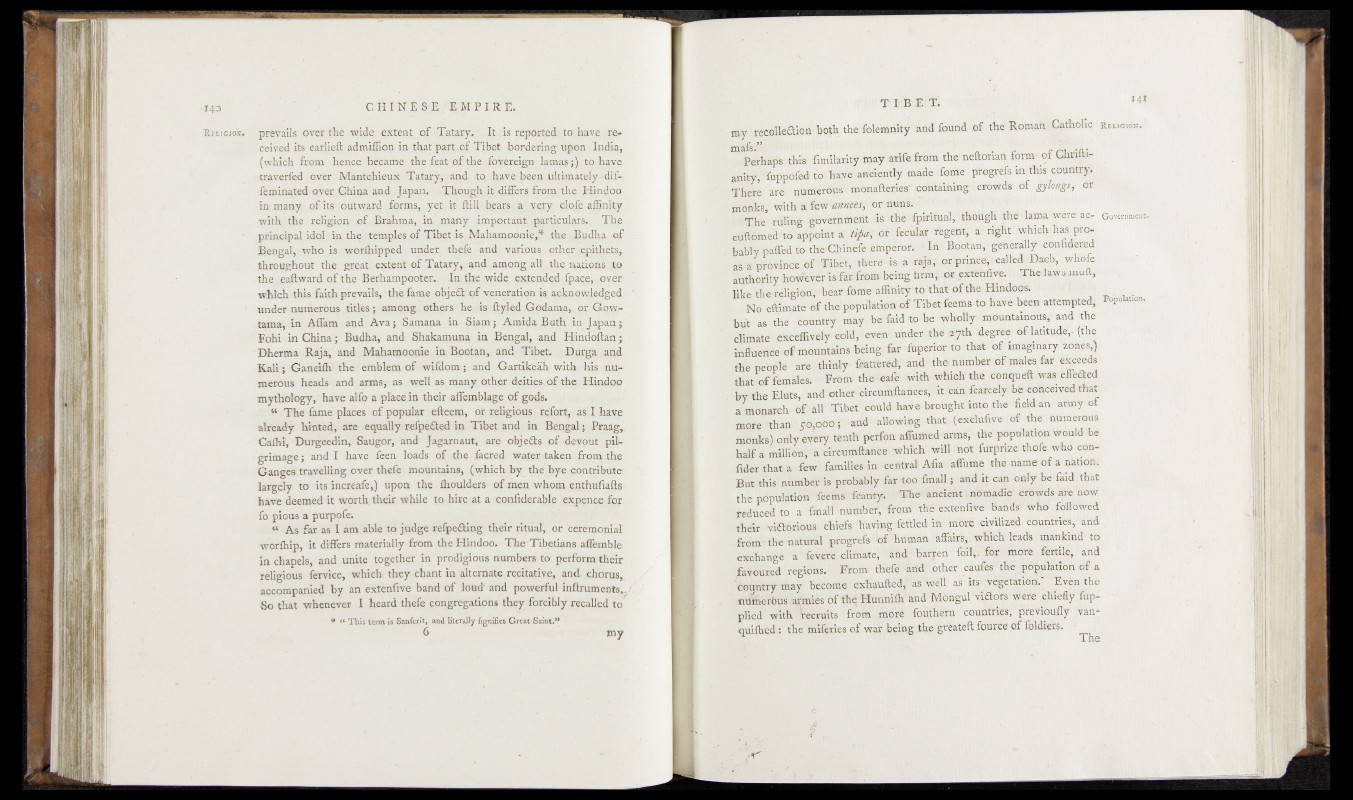
•Religios. prevails over the wide extent of Tatary, It is reported -tojiayg received
jts earlieft admiffion in that part, of Tibet bordering upon India,
(which from' hence became the 'fissrt-pf the fovereign lama^j^to.have
traverfed over Mantchieux Tatary, and to have been ultimately-dif-.
, fetninated over Qhinaand Japan. Though it differs from the Hindoo
in many of its outward forms, yet it ftill bears a very clofe affinity
with the religion of Brahma, in many important particulars. The
principal idol in the temples of Tibet is Mahamoonie,* the Budha -of
Bengal* who is worlhipped under, thefe and various other-epitljet^,
throughout the great: extent of Tatary, and among all the nation« to
the paftward of the Berhampooter. In the wide extended fpace; over
which this faith prevails, the fame object of veneration is acknowledged
- Bnder numerous titles; amqng others he is ftyled Gpdaqm» pr Gqw>*
tama, in Affam and Ava; Samana in; Siam; Amida Buth ip Japan,*
Bohi in China; Budha, and Shakamupa in Bengal, and Hindoftan
Dherma Raja, and Mahamoonie in Bootan, and Tibet. Durga and
Kali; Ganeifli the emblem of wifdom; and Gartik^h withr-hi?
iuerous heads and arms; as well as many other deities , of the Hindoo
mythology, have alfo a place in their affembiage of gods.
«* The fame places of popular efteem, or religious refort, as I have
already hinted, are equally refpe&ed in Tibet and in Bengal; Praag,
Gaflii, Durgeedin, Saugor, and Jagarnaut, are objects of desput pilgrimage;
and I have feen loads of the faered water taken from the
Ganges travelling over thefe mountains, (which by the bye contribute
largely to its increafe,) upon the fhoulders of men whom enthufiafte
have deemed it worth, their while to hire at a confiderable expence for
fo pious a purpofe.
ffr As far as I am able to judge refpefting their ritual, or 'ceremonial
worfhrp, it differs materially from the Hindoo. TheTibetkns affemble
in chapels, and unite together in prodigious numbers to perform their
religious ferviee, which they chant in alternate recitative, and. chorus,
accompanied by an extenfive band of loud’' and powerful inftruments.,
So that whenever I heard thefe congregations they forcibly recalled to
* “ This term is Sanfcrit, and literally figmfies Great Saint.”
6
my recollection both the-fölemnity and found of the Roman-Catholic'rel
Perhaps thiavïi'milariey may a*fefcóm the neff orian, form [ J Chrifti-
anity^ fuppofed to ,h:pse .anciently made fomej- pïogrjéfs- m tins oou-mtr^.
There are- numerous* monafterjes edntaiafeg- ^Crowds iöi-jgyhngs, or"
Biötike, vtith’-^ f e ^ orfinaWSi jy’^ ? ' *' *11 1 1
The ruling gbverhmerit fptr£tual,.thohgh^Mvlam1a'iWère-aa- Go^Wau
eüfïbfaed'toképb&t a M IS § g p |{ $*ight wMeb|has probacy
pa-fed to theCMöefpf^óf^l IntiBëö^n^g^l^confi^red
jf9a pro-vincfe of Tibet, É gM f | § ||§ > I
authority^howfever istfarffrotefemg firm,’ or e^enfive.-tS'The.kwamuft,
No‘ eftimate Of the popukttotttof Tibet feams to P g M attempted! ToPuUtl0n.
but as éie^&untry may belaid to-be wholly-mountaLnous, and the’
climate èxcéfliveiy eoWyevehbumkr the 27th degree of latitude,-ge I
influence-of mountains -being1 far ffüpèriorto that of imaginary zóöfeSj-
fhe people are thinly lettered, and the- number exoeéds
that Of females. From the :eafe -with which the ConqUeffwas effe&ed
by-the Elute, and dther circumftaflees, it catfTcaiÉcely beéoqceivOd that?
a monarch- of all Tibet ooöld havev brought into the held an.'aftny of
more than yö,.000-5 and allowing ^ that (erifelufive^of the Upturn-
monks) only every tenth perfon afiumod arms,- the popnktma would be
half a million-, a-oircumftance which will ttdt furprize thofe-Who eon-
fider that a few families-in central Afia affurae rbémkn^'Ofi action*
But this number is probably fartootfmall; and it can oaly be fold that
the population Teems* feanty, The ‘aticie'nt nomadiè' terbwds are new
reduced to a fmall number, from the extenfive bands who followed
their victorious chiefs having fettled in more civilized countries, and
from-the natural progrefs of hümaO affairs, ’which lead’s mankind to
exchange a fevere cKmate, and’ barren '^o^, fèrtile,; and
favoured regions. From theie -and’ ,other C^umSi!|he population of a
'country may become exhaufted, as'^ell aS ’ ite'V^dtdtioh*/ Even the
n t fcb u s iaimies of the Hunnifli and Mongol' vtéfoïs cjuéflf fup- -
plied with Vecruits from more fouthern countries', p^ejvioiifty van*
quiflied: the miferies of war being the grèateft fource of foldiers,